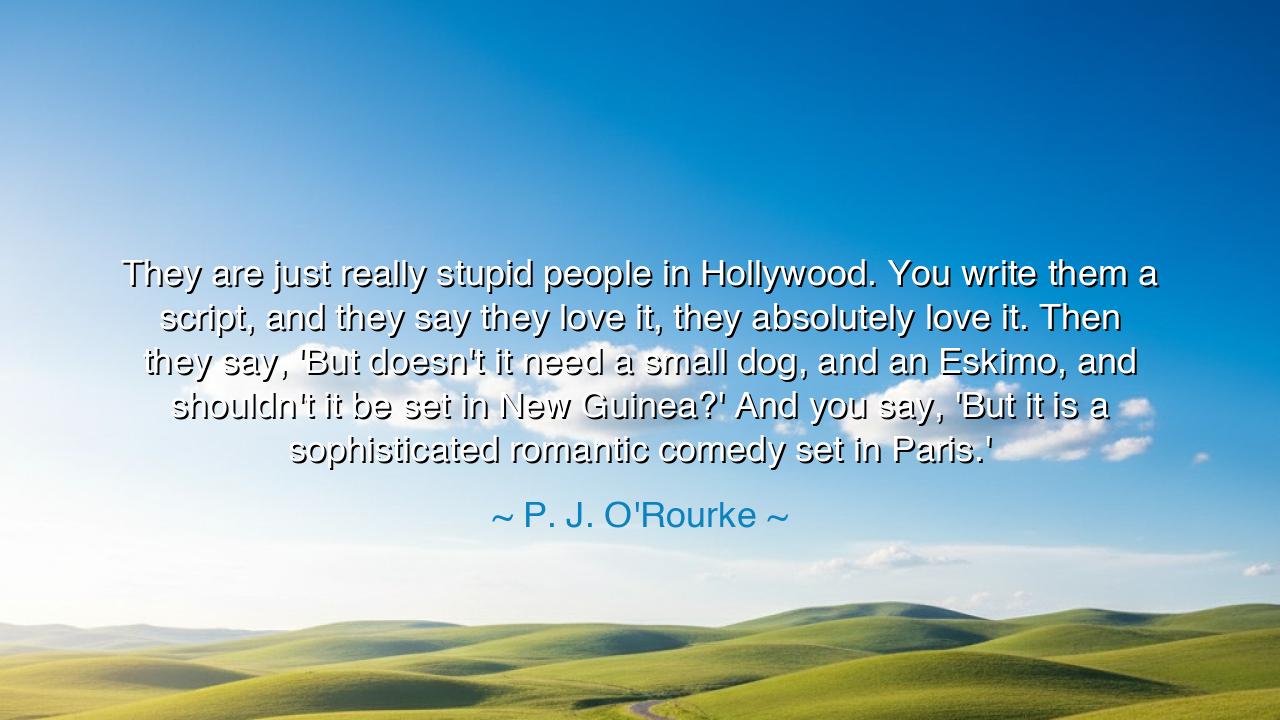
They are just really stupid people in Hollywood. You write them a
They are just really stupid people in Hollywood. You write them a script, and they say they love it, they absolutely love it. Then they say, 'But doesn't it need a small dog, and an Eskimo, and shouldn't it be set in New Guinea?' And you say, 'But it is a sophisticated romantic comedy set in Paris.'






Hear now the voice of P. J. O’Rourke, sharp and unyielding, who once declared: “They are just really stupid people in Hollywood. You write them a script, and they say they love it, they absolutely love it. Then they say, ‘But doesn’t it need a small dog, and an Eskimo, and shouldn’t it be set in New Guinea?’ And you say, ‘But it is a sophisticated romantic comedy set in Paris.’” Though spoken in jest, these words shine a cruel light upon the folly of those who seek to tamper with creation without reverence for its essence. In this lament lies a timeless warning: when vision is corrupted by needless meddling, beauty is lost.
From the beginning of art, there has been tension between the creator and the gatekeeper. The poet fashions a song of the soul, yet the patron demands it be altered to flatter his pride. The painter births a vision of the heavens, yet the merchant insists upon brighter colors to sell it for more coin. And so the flame of creation, once pure, is clouded by the smoke of interference. O’Rourke’s tale of Hollywood is but the modern mask of this ancient struggle. The artist knows what must be born, but the powers of commerce do not see the truth—they ask for dogs and Eskimos where none belong.
Consider the fate of the great painter Michelangelo, commanded by Pope Julius II to carve his tomb. Michelangelo, filled with holy fire, envisioned a monumental work of dozens of statues, grand in scale and divine in purpose. Yet the Pope, distracted by wars and wealth, reduced the commission, delayed the funds, and demanded endless revisions. What began as a vision of glory was diminished by earthly meddling. And yet Michelangelo, though wounded, transformed his energy into other labors, leaving behind the Sistine Chapel ceiling—a masterpiece born not of compliance but of defiance. Here is the same truth: the meddling of patrons may hinder, but the spirit of creation cannot be bound forever.
The heart of O’Rourke’s words is this: true art requires clarity of vision. The romantic comedy he describes was set in Paris, not because of accident, but because the city itself sings of love, longing, and wit. To move it to New Guinea is to betray its essence, to strip it of the spirit that gave it birth. And yet, how often do men in power, blind to meaning, demand such betrayals? They mistake novelty for wisdom, gimmick for substance. They forget that true creation is not made stronger by clutter, but weaker.
Yet let us not merely scorn the foolishness of Hollywood executives, for this error is not theirs alone. In life, how often do we allow others to impose upon our vision? A man may dream of peace, yet others tell him he must first conquer. A woman may yearn to write, yet others insist she must be practical, abandon her craft, and earn her bread by soulless means. Thus the fire of inspiration is doused by the water of compromise. O’Rourke’s lament is universal—it is the cry of every soul whose work was misunderstood, twisted, or diminished by those who could not see its heart.
The lesson is clear, children of tomorrow: guard the purity of your vision. Accept counsel when it sharpens truth, but resist when it demands you betray the essence of your work. Not every suggestion is wisdom; not every authority sees clearly. Even kings and magnates can be blind. It is the duty of the creator to know the difference, to hold fast to what is essential, and to cast aside what is foolish.
Therefore, take up this counsel: when you labor to create—whether it be a story, a life, or a legacy—know your Paris, and do not trade it for New Guinea. Know your soul’s vision, and do not surrender it for trifles. Remember that true art, true meaning, comes not from pleasing every voice, but from fidelity to the truth within. If you keep this flame unshaken, then your work will endure, shining long after the clamor of foolish advice has fallen silent.
Thus O’Rourke’s jest becomes a timeless commandment: do not let others clutter the sacredness of your creation with dogs, Eskimos, and false distractions. Stand firm, and let your art remain what it was always meant to be.






AAdministratorAdministrator
Welcome, honored guests. Please leave a comment, we will respond soon